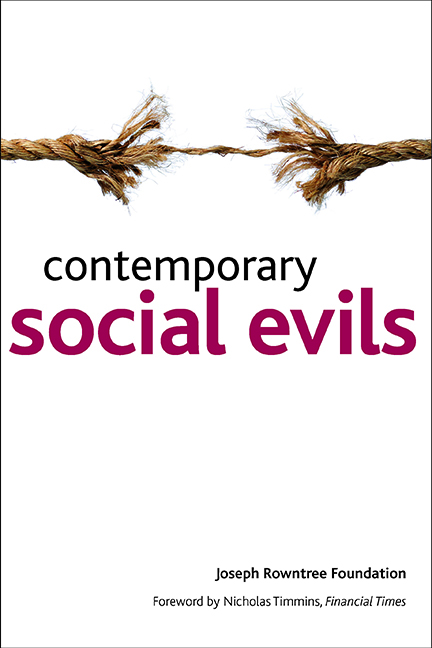Book contents
- Frontmatter
- Contents
- Foreword
- Acknowledgements
- Notes on contributors
- 1 Introduction
- 2 ‘Social evils’ and ‘social problems’ in Britain since 1904
- Section 1 Public Voices
- Section 2 Viewpoints
- A decline of values
- Distrust
- The absence of society
- Individualism
- Inequality
- Section 3 Reflections
- Appendix: How the ‘social evils’ consultations were organised
- Index
1 - Introduction
Published online by Cambridge University Press: 26 January 2022
- Frontmatter
- Contents
- Foreword
- Acknowledgements
- Notes on contributors
- 1 Introduction
- 2 ‘Social evils’ and ‘social problems’ in Britain since 1904
- Section 1 Public Voices
- Section 2 Viewpoints
- A decline of values
- Distrust
- The absence of society
- Individualism
- Inequality
- Section 3 Reflections
- Appendix: How the ‘social evils’ consultations were organised
- Index
Summary
When Joseph Rowntree set up the trusts that bear his name in 1904, he urged them to “search out the underlying causes of weakness or evil in the community”. Strikingly, he also advised the trustees of his considerable wealth to keep alert to the “changing necessities of the nation” and ensure that they continued to focus on investigating the underlying causes of evil, rather than the superficial manifestations. He was clear that, while there were “scourges of humanity” that plagued his own times – including poverty, war, slavery, intemperance, the opium trade and gambling – times were bound to change. He wanted his trusts to be “living bodies, free to adapt themselves to the ever changing necessities of the nation”. It was in this spirit of inquiry that the Joseph Rowntree Foundation (JRF), a century on, decided to investigate the nature of ‘social evil’ in the 21st century.
To gather contemporary perspectives, we launched a national debate that proved to be more wide-ranging and more challenging than we dared hope. While allowing us to revisit our original mandate, it also prompted a large number of people across the UK to consider fundamental questions about the nature of society. The term ‘social evils’ can feel rather uncomfortable. As a Foundation we are used to considering the administrative improvements that can make a difference to the lives of people living in poverty and disadvantage. However, a discussion about ‘social problems’ would be unlikely to have prompted the same level of impassioned public engagement as our general invitation for people to send us their views on social evils. The concept of ‘evil’ appears to have led many people to look beyond commonly discussed social problems such as drugs, poverty or social exclusion, to express more fundamental, less tangible fears about the nature of society and how it is changing. It brought valuable urgency to the debate, and a palpable moral sense.
The national discussion engaged the thoughts and interests of more than 3,500 people who responded to an online consultation exercise initiated through JRF's website, as well as those who took part in a number of public meetings and in radio phone-ins. It also gained the interest and enthusiasm of people whose voices are not usually heard in these discussions.
- Type
- Chapter
- Information
- Contemporary Social Evils , pp. 1 - 4Publisher: Bristol University PressPrint publication year: 2009



